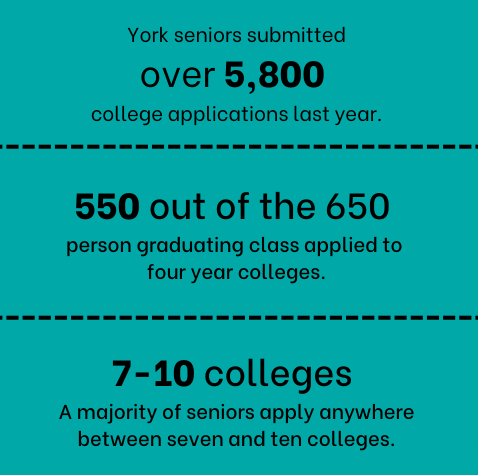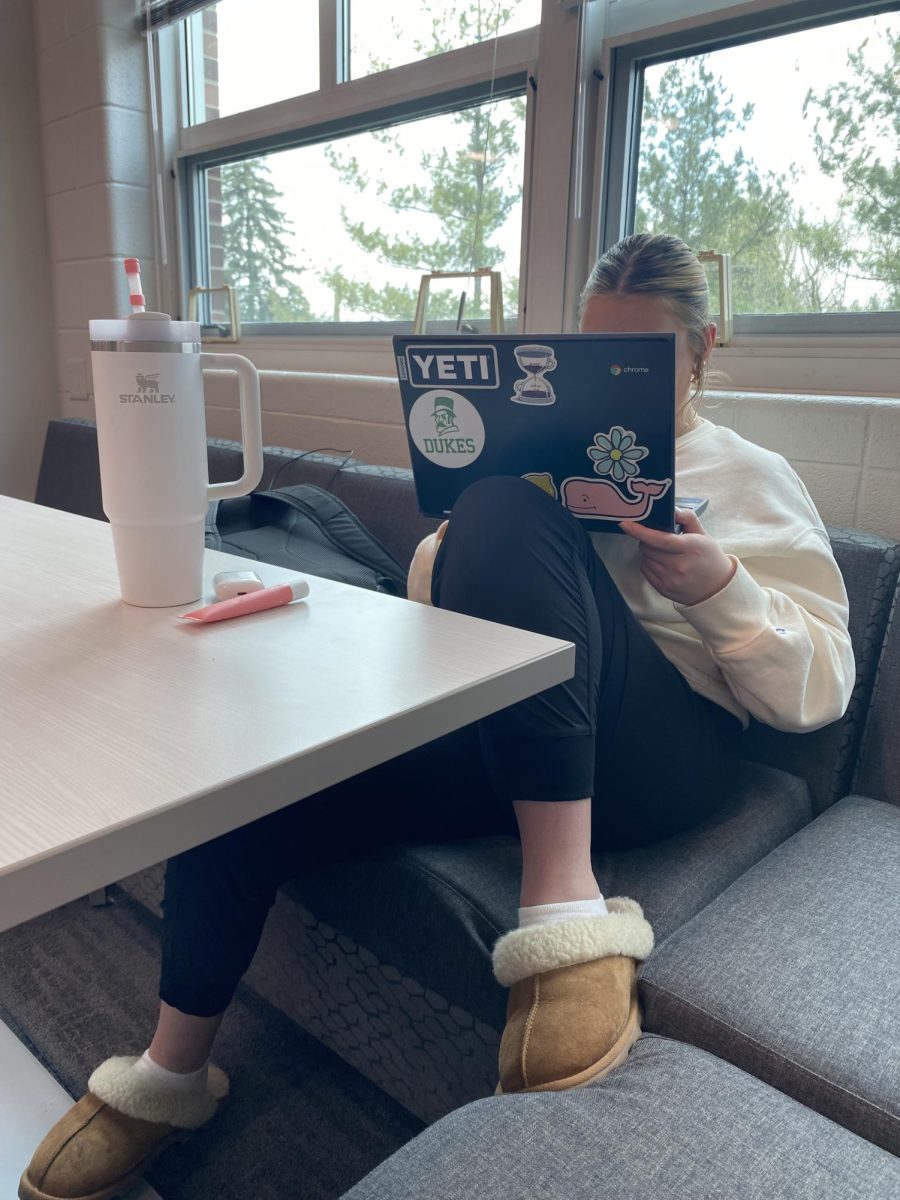The fall semester of senior year is notoriously a period of stress and anxiety, thanks to one undertaking: the college application process. Since 2014, the number of yearly submitted applications has steadily risen according to the National Center for Education Statistics. Without a doubt, York plays a role in this statistic, and countless seniors end up self-inflicting this responsibility onto their plate. However, York’s seniors don’t have to take on this battle alone. Amy Thompson, York’s college and career counselor, provides students with the help they need to stand out in the application pool.
Thompson has been a part of the York staff for 25 years, most of which she spent in the College and Career Resource Center. Throughout her tenure, Thompson has provided countless resources to assist students as they formulate their applications. With so many building blocks to their application, many students find it hard to keep track of what they need to complete.
“Since we as students don’t really know much about the application process it’s very helpful to have a resource to turn to when it gets confusing or when we just don’t know if our application is good enough for a college,” senior Olivia Poepping said.
Over Thompson’s time at York, college applications have changed dramatically. Until the early 2000s, the college application process was done completely on pen and paper. The switch to online made it possible for students to apply to far more colleges and universities. Another helpful program that has allowed students to simplify the application process was the Common Application. Started in 1975, the non-profit company has expanded to hundreds of colleges, streamlining their admission processes.
“It makes it easier for me to support [the college application] process because I can create a fake account, I can really get to know how the application works, so I can provide instructional
videos and explain things,” Thompson said. “Whereas if there’s all these different systems I have to troubleshoot with the kids for each one.”
Although the Common Application and other similar programs have made the overall process streamlined, there still is a great deal of work needed to create a solid application that stands out from the rest. This added commitment on top of senior’s already packed schedules adds another layer of stress.
“I believe the college application process has become more difficult throughout the years, but from an admissions officers point of view I can see how they would like to know the information they are asking for,” senior Maryam Ali said. “But with other activities and academics senior year, the college application adds a lot to your plate.”
There is no question that college applications are difficult, seen as there are so many parts that go into said applications and admissions. Whether it be a student’s GPA, transcript, essay, or test score, each individual piece of information plays a pivotal role in providing colleges with a holistic view of the applicant. However this may leave students to question: what part of my application is most important? With many colleges becoming test-optional, high test scores seem to become less crucial to applicants.

“I don’t think test scores are super important this year since most schools remain test optional,” senior Alisha Sayi said. “I think they serve as a way to boost your application, but they don’t harm you in any way if you withhold your test scores.”
Following the COVID-19 pandemic, 80% of schools in the United States remain test-optional according to reporting from the Washington Examiner. Currently, many colleges leave it up to the applicant to decide whether or not their test score is worth including in their application.
“There’s no doubt that we are a well-resourced school, so colleges would probably prefer to see a score from a [York] student,” Thompson said. “But in general, optional is optional.”
Although over 1,900 schools remain test-optional during the 2024 application cycle, it is unclear if this trend will continue. There is a clear divide between schools permanently instituting test-optional policies and schools declaring when their temporary test-optional applications will be discontinued. This being said, Thompson encourages York students to keep putting use to the resources provided through the school to obtain high test scores for the future.
“I talk to juniors and their parents starting in November, and I tell them to try their best,” Thompson said. “If you can get a good score, it can only help you.”
Although the college application process is a long uphill battle, York’s seniors are prepared to put their best foot forward. The many changes made over the past years to the college application process paves the way for students to succeed.
“It starts day one,” Thompson said. “When you start at York, that you’re showing up everyday, you’re doing the best you can. No one can expect you to do more than the best you can.”
Although application anxiety may seem like it only pertains to seniors, college applications create an impact past students. Parents, caretakers, teachers and advisors all may feel the same stress as they support students in the midst of the application season.
How do college applications affect parents?
Many seniors at York rely on their parents as a support system and that is no different when it comes to the college application process. Although parents can act as an advisor while curating applications, most don’t have the answers to the countless questions students may have. Luckily, parents can count on York’s resources to support their students when necessary.
“I think [my student] has received all the help he needed, but only if he asked for it,” Tracey Bianchi said. “He took advantage of a lot of the events at York, and he has gone to drop-ins with Mrs. Thompson along the way.”
Inevitably, parents want to ensure their child has a strong, thoughtful application that stands out to admission officers. However, it is easy for parts of the application, especially the personal statement essay, to become over-edited. This may leave parents with the concern that the application is a pseudo version of their student.
“The most important part is that the application reflects him and who he is. There is a temptation to inflate stories or have help with making essays perfect,” Bianchi said. “But the application needs to reflect who he is so that he truly ends up at the right school.”
How do college applications affect teachers?
Every fall, York’s teachers are asked to write letters of recommendation for seniors to include in their college applications. Year after year, the English and social studies departments in York receive the most letter of recommendation requests. Typically these classes include the most class discussions, leading to closer connections between students and teachers, therefore these teachers are the perfect candidate for writing these letters.
“Letters are a lot of extra work for teachers,” Thompson said. “So spreading out the requests among a larger group of teachers is very helpful.”
Kathryn Gilbertson, a freshman and junior English teacher, has received 24 letter of recommendation requests, making her one of the most sought after advisors in York. Although time consuming, Gilbertson works hard to craft each letter she writes to be a significant addition to a senior’s application, making them stand out to an admissions officer.
“I try to make every [letter of recommendation] very different and very specific, so it does take a long time,” Gilbertson said.
Letters of recommendation add a nuanced perspective to any student’s application. Teachers are able to share their perception of the applicant after seeing them everyday for an entire school year, adding a deeper understanding of the senior as a whole.
“I think what’s great about letters of recommendation is that as a teacher we spend so much time in class with these kids,” Gilbertson said. “We have a very unique take that maybe a parent or coach wouldn’t necessarily have.”










